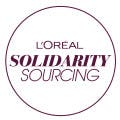SOME MEASURES TAKEN IN FAVOUR OF LOCAL COMMUNITIES
| Throughout the production chain |
The environmental risks related to L’Oréal’s sites and activities may potentially have an impact on the local communities in which the Group operates. In this area, L’Oréal has a long-standing commitment to managing risks and reducing its environmental footprint, and is implementing an ambitious policy described in detail in section 4.3.1. “Environmental policy” of this document. |
||
|---|---|---|---|
| A responsible approach to property assets | For prospective acquisitions of premises or building land, L’Oréal must ensure that the former owners and/or occupiers have not been unfairly removed and/or that any expropriation by the authorities was conducted in accordance with international law, namely with the free agreement and compensation of the previous owners and/or occupants. | ||
| Responsible sourcing | See “Giving preference to the use of sustainably sourced renewable raw materials” in section 4.3.1.3.1. “Eco-designed products” of this document. | ||
| Solidarity Sourcing: Using the Group’s purchasing power to serve social inclusion |
Through its Solidarity Sourcing programme, established in 2010, due to its many industrial and administrative sites all over the world, L’Oréal is heavily involved in the life of local communities in the areas neighboring its sites and suppliers. While being a company committed to demonstrating strong corporate citizenship, L’Oréal makes a contribution to many local projects. The programme aims to use the Group’s purchasing power to serve social inclusion by dedicating part of its purchases to suppliers providing access to work and a sustainable income for people who are generally excluded from the labour market, economically vulnerable communities, including small businesses and those that have trouble accessing major contractors. The programme concerns all the Group’s suppliers and values their commitment to Diversity, Equity and inclusion. The Solidarity Sourcing programme concerns for example: fair trade producers, companies which employ people with disabilities, social insertion enterprises, or companies owned by minorities (when this is permitted by national legislation). As part of L’Oréal for the Future, its new sustainability programme announced in June 2020, the Group is renewing its goal to allow over 100,000 people from underprivileged or poor communities to find work by 2030. Solidarity Sourcing offers a novel purchasing approach due to its global, holistic nature:
The ambition of the programme is to associate economic performance with a positive corporate social responsibility footprint. Global beneficiaries of the Programme included 2,499 people with a disability in 28 countries in 2021. The number of beneficiaries rose by 20% over the last three years. This was achieved as the result of a stronger commitment from the Group, despite the unprecedented Covid-19 health crisis, which particularly impacted this community.
Throughout 2021, the Solidarity Sourcing programme enabled 89,093 people from underprivileged or poor communities all over the world to gain access to work or to keep a job and receive a decent income. This represents an additional 7,955 people compared to 2020, an increase of 9.8%. Solidarity Sourcing today has 365 projects up and running in 709 local initiatives (with an additional 211 initiatives launched in 2021) in 61 countries, with the support of 70 third parties. This programme has offered the opportunity for the Group’s purchasers to enrich their jobs by contributing to improving the lives of thousands of people involved in the processing of the goods and services purchased. As a result, in 2021, 176 buyers supported Solidarity Sourcing project, an increase of 7% compared to 2020. Focus on the Group’s solidarity purchases in France 77 projects of the global Solidarity Sourcing programme support employment in France (1 in 5 projects), deployed in 122 local initiatives. France, the birthplace of the Group, is the country that undertakes the highest number of Solidarity Sourcing projects (out of the 61 countries in which the programme operates) and the seventh country in number of beneficiaries behind Burkina Faso, Indonesia, India, Madagascar, the United States and China. In 2021, solidarity purchases in France represented 2,737 full-time jobs. The number of jobs generated by the Solidarity Sourcing programme in France was up 9% compared with 2020 (representing 228 jobs), thanks in large part to the mobilisation of Group purchasing managers and 130 suppliers including 68 Adapted Enterprises (Entreprises Adaptées – EA) and work assistance organisations (Etablissements et Services d’Aide par le Travail – ESAT). |

